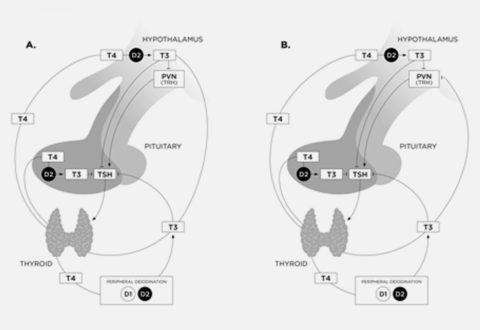Triiodothyronine (T3), the active form of thyroid hormone is produced predominantly outside the thyroid parenchyma secondary to peripheral tissue deiodination of thyroxine (T4), with less than 20% being secreted directly from the thyroid. In healthy individuals, plasma T3 is regulated by the negative feedback loop of the hypothalamus-pituitary-thyroid axis and by homeostatic changes in deiodinase expression. Therefore, with the exception of a minimal circadian rhythmicity, serum T3 levels are stable over long periods of time. Studies in rodents indicate that different levels of genetic disruption of the feedback mechanism and deiodinase system are met with elevation in serum T4 and thyroid stimulating hormone (TSH) levels, while serum T3 levels remain stable. These findings have focused attention on serum T3 levels in patients with thyroid disease, with important clinical implications affecting therapeutic goals and choice of therapy for patients with hypothyroidism. Although monotherapy with levothyroxine is the standard of care for hypothyroidism, not all patients normalize serum T3 levels with many advocating for combination therapy with levothyroxine and liothyronine. The latter could be relevant for a significant number of patients that remain symptomatic on monotherapy with levothyroxine, despite normalization of serum TSH levels.
Defending plasma T3 is a biological priority.
Sherine M. Abdalla and Antonio C. Bianco. Clinical Endocrinology. November, 2014. PMID: 25040645
